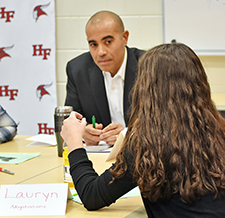The art of negotiation is tedious and difficult. That’s what students in the International Relations class at Homewood-Flossmoor High School learned when they became negotiating teams for two fictitious countries that needed to work on shared hydropower and ecological and farming needs along a shared river.
could relieve water shortages during a simulation
program at H-F High School. (Provided photos)
The art of negotiation is tedious and difficult.
That’s what students in the International Relations class at Homewood-Flossmoor High School learned when they became negotiating teams for two fictitious countries that needed to work on shared hydropower and ecological and farming needs along a shared river.
Could they come together to share resources and make improvements? In a two-hour demonstration they struggled to find common ground with neither side believing the other would hold true to the deal.
a student mediator on a
proposal during an
international relations
class simulation.
The Republic of Southerland was described as a mostly agrarian state that needed a dam for power and to give relief to an area prone to flooding. The Republic of Northeria was a neighboring country with two medium size dams that it used for hydropower to improve its manufacturing base.
In the scenario, Northeria wanted to improve its dams for greater capacity. Southerland wanted its own dam. Both had gone to the Finance the World Bank for loans, but the bank would only provide the money if the two countries could work together.
“We’re giving them way more than they’re paying for,” one member of the Northeria delegation argued during the Nov. 16 simulation.
“How are we going to insure that we can do this? We have problems within ourselves and within each other,” Rob Hallam, chief negotiator for Southerland said. “If you need these resources and we are deciding to do this plan why would we close one of your dams first to make it so you are only supporting yourself? We must build a dam in Southerland first, so we can supplement when you take the hit to close one of your dams (for renovation).”
Ian Solomon, an international negotiations expert, mediated the session and offered the students pointers he’s learned during his 20-year career working on negotiations, cooperation and conflict resolution.
The exercise was based on work the former Flossmoor resident has done during his career with the U.S. Department of the Treasury in the Obama Administration and later as executive director of the World Bank.
The students were asked to look at the issues from all sides. Their input on the deal was based on their roles as the country’s finance minister, military leader, environmentalist, secretary of commerce and campaign officials for the upcoming election.
Participants in the exercise had some difficult questions to consider. Would the military trample the open space on the border that was designated for environmental sustainability? Would the country have the means to pay back the millions of dollars it would be borrowing? Once a deal was made, could the campaign officials on both sides convince voters they made a deal that would benefit their people?
“One of the key things in negotiations is the timetable,” Solomon said. “If you have no deadline, then it’s very hard to make much progress.”
Also, a deal is not a deal until all the paperwork with the finite details is signed.
“You sign a vague concept note, and then there are sheets with every detail,” he told the students. “A lot of times during that fine tuning things fall apart.”
“Did you guys trust each other?” he asked. “No. So what do you do when you don’t trust each other? You bring in a third party.”
Solomon didn’t intend to discourage the students, but rather to help them learn about the art of negotiations. This simulation “was just a small taste,” he told them.
There are times when those around the negotiating table will walk away, but Solomon said if both sides can be open, good things can happen.
“Imagining creates possibilities,” he said.
Students in the International Relations class are Paige Adams, Megan Bolling, Armahri Brown, Lauryn Castagna, Zane Coston, Amanda Fieramosca, Madelyn Fitzgerald, Robb Hallam, Khari Hill, Jeff Howze, Jordan Jennings, Alex Lee, Nolan Levy, Winston Pauling, Michaela Reid, Andrew Sline, Tykari White, Mara Winfrey and Chris Woods.
Teacher Scott Aronson leads the class.
Homewood-Flossmoor High School during a
negotiation simulation.

